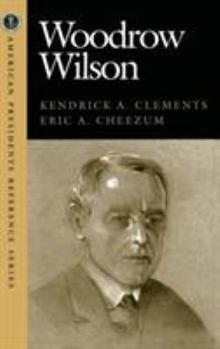Woodrow Wilson
Each volume in the new American Presidents Reference Series is organized around an individual presidency and gathers a host of biographical, analytical, and primary source historical material that will analyze the presidency and bring the president, his administration, and his times to life. The series focuses on key moments in U.S. political history as seen through the eyes of the most influential presidents to take the oath of office. Unique headnotes provide the context to data, tables and excerpted primary source documents.
Woodrow Wilson was born on December 28, 1856. He taught history and later political science at Bryn Mawr College, Wesleyan University, and Princeton University. In 1902 he was unanimously elected as president of Princeton. In 1910 he was elected governor of New Jersey. On the forty-sixth ballot at the 1912 Democratic National Convention, Wilson was nominated as the party′s presidential candidate. Benefiting from Theodore Roosevelt′s ticket-splitting third-party nomination, Wilson was elected the twenty-eighth president of the United States.
Key events during the Wilson administration include the reduction of the tariff, enactment of the federal reserve system, creation of the Federal Trade Commission, his narrow reelection against Charles Evans Hughes, Wilson′s Fourteen Points, and the League of Nations. On October 2, 1919, Wilson suffered a stroke, which left him incapacitated. Historians have concluded that his wife, Edith, conducted much of the affairs of state on behalf of the invalid Wilson. Woodrow Wilson died on February 3, 1924.
This new volume on the presidency of Woodrow Wilson will cover
his reformist-natured domestic policies, World War I, the Fourteen Points, and the League of Nations, the role of Edith Bolling Wilson in the Wilson presidency.




